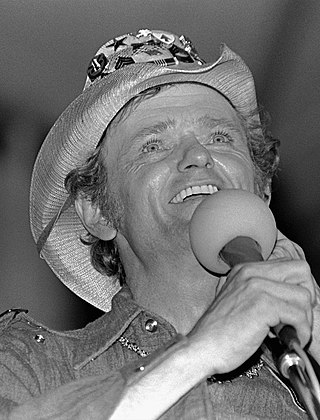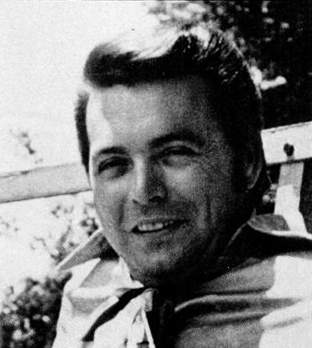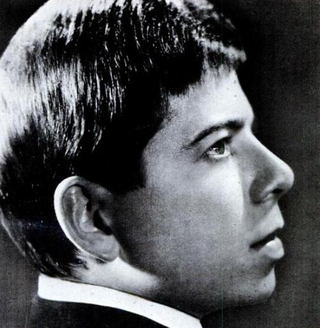Related Research Articles

Ronnie Lee Milsap is an American country music singer and pianist.

Brooks & Dunn is an American country music duo consisting of Kix Brooks and Ronnie Dunn, both of whom are vocalists and songwriters. The duo was founded in 1990 through the suggestion of songwriter and record producer Tim DuBois. Before their formation, both members were solo recording artists, having charted two solo singles apiece in the 1980s. Brooks also released an album for Capitol Records in 1989 and wrote hit singles for other artists.

Jerry Reed Hubbard, known professionally as Jerry Reed, was an American country singer, guitarist, composer, songwriter and actor who appeared in more than a dozen films. His signature songs included "Guitar Man", "U.S. Male", "A Thing Called Love", "Alabama Wild Man", "Amos Moses", "When You're Hot, You're Hot", "Ko-Ko Joe", "Lord, Mr. Ford", "East Bound and Down", "The Bird", and "She Got the Goldmine ".

Ronald Gene Dunn is an American country music singer-songwriter and record executive. Starting in 2011, Dunn has worked as a solo artist following the temporary dissolution of Brooks & Dunn. He released his self-titled debut album for Arista Nashville on June 7, 2011, reaching the Top 10 with its lead-off single, "Bleed Red". After leaving Arista Nashville in 2012, Dunn founded Little Will-E Records. On April 8, 2014, Ronnie Dunn released his second solo album, Peace, Love, and Country Music through Little Will-E Records. On November 11, 2016, he released his third album Tattooed Heart on NASH Icon label. His fourth album Re-Dunn was released on January 10, 2020.

"Burning Love" is a 1972 song by Elvis Presley, written by Dennis Linde, originally released by Arthur Alexander earlier in 1972. Presley found major success with the song, it becoming his final Top 10 hit in the American Hot 100 or pop charts, peaking at number 2.

Mickey Leroy Gilley was an American country music singer and musician. Although he started out singing straight-up country and western material in the 1970s, he moved towards a more pop-friendly sound in the 1980s, bringing him further success on not just the country charts, but the pop charts as well.

Robert Charles Goldsboro is an American pop and country singer and songwriter. He had a string of pop and country hits in the 1960s and 1970s, including his signature No. 1 hit "Honey", which sold over 1 million copies in the United States, and the UK top-10 single "Summer ".

Ray Wylie Hubbard is an American singer and songwriter.

"You Don't Know Me" is a song written by Eddy Arnold and Cindy Walker in 1955. "You Don't Know Me" was first recorded by Arnold that year and released as a single on April 21, 1956, on RCA Victor. The best-selling version of the song is by Ray Charles, who took it to number 2 on the Billboard Hot 100 chart in 1962, after releasing the song on his number 1 album Modern Sounds in Country and Western Music. The first version of the song to make the Billboard charts was by Jerry Vale in 1956, peaking at number 14 on the pop chart. Arnold's version charted two months later, released as an RCA Victor single, 47–6502, backed with "The Rockin' Mockin' Bird", which reached number 10 on the Billboard country chart. Cash Box magazine, which combined all best-selling versions at one position, included a version by Carmen McRae that never appeared in the Billboard Top 100 Sides listing.

Ronald Dean McDowell Sr. is an American country music artist, songwriter, and actor. He is best known for his 1977 song "The King Is Gone", a tribute to Elvis Presley, who had recently died. From that single onward, McDowell charted more than thirty Top 40 hits on the Billboard country music charts, though he never experienced further pop success after "The King is Gone." Two of his singles – "Older Women" and "You're Gonna Ruin My Bad Reputation" — reached Number One on the country charts, while eleven more reached Top Ten. He has also released more than twenty studio albums, and has been signed to Curb Records since 1986.

"Since I Don't Have You" is a song written and composed by Jackie Taylor, James Beaumont, Janet Vogel, Joseph Rock, Joe Verscharen, Lennie Martin, and Wally Lester. It was first a 1958 hit single for the doo-wop group the Skyliners on the Billboard Hot 100. Country music singer Ronnie Milsap had a hit with the song in 1991. American hard rock band Guns N' Roses also had some success in 1994 with their version of the song which reached the top 10 on the UK Singles Chart.
"Mountain of Love" is a song written by Harold Dorman. Dorman released his version as a single in 1960. It was originally recorded in late 1959 at the Royal Recording Studios in Memphis before the backing vocals were overdubbed. It performed well, spending 19 weeks on the Billboard Hot 100 chart, peaking at No. 21 in May 1960, while reaching No. 7 on the Billboard Hot R&B Sides chart, and No. 25 on Canada's "CHUM Hit Parade". The song was his only top forty hit on the Billboard Hot 100 and was the highest-charting single of his career.
"Ruby Baby" is a song written by Jerry Leiber and Mike Stoller. It was originally recorded by the Drifters. Their version was released as a single by Atlantic Records in 1956. It peaked at No. 10 on the US Hot R&B chart.
"Faded Love" is a Western swing song written by Bob Wills, his father John Wills, and his brother, Billy Jack Wills. The tune is considered to be an exemplar of the Western swing fiddle component of American fiddle.

"Things" is a song which was written and recorded by Bobby Darin in 1962. Released as a single, it reached No.3 in the U.S.and Canada, No.2 in the U.K., and No.3 in the first-ever official Irish Singles Chart, published by RTÉ in October 1962. It was later covered by Ronnie Dove and became a Top 30 country hit for him.

"Don't Take Your Guns to Town" is a song written and recorded by American singer Johnny Cash. It was released in December 1958 as the first single from the album The Fabulous Johnny Cash.

"Cowboys and Clowns" is a song written by Steve Dorff, Snuff Garrett, Gary Harju and Larry Herbstritt, and recorded by American country music artist Ronnie Milsap. It was released in June 1980 and is featured on the soundtrack for the film Bronco Billy. The song was Milsap's fifteenth number one on the country chart. The single stayed number one for one week and spent a total of twelve weeks on the country chart.

"(I'd Be) A Legend in My Time" is a song written and recorded by Don Gibson in 1960. It appeared as the B-side of his hit "Far Far Away", from the album Sweet Dreams. Gibson re-recorded the song on the 1972 album Country Green.
"She Got the Goldmine (I Got the Shaft)" is a song written by Tim DuBois and recorded by American country music singer Jerry Reed. It was released in June 1982 as the third and final single from the album, The Man with the Golden Thumb. A satire on divorce, the song was Reed's third and final No. 1 country hit in the late summer of 1982, and one of his signature tunes.
"'Till I Gain Control Again" is a country song written by Rodney Crowell and originally recorded by Emmylou Harris in 1975. The song was included on her 1975 studio album Elite Hotel. The song is most known by the No. 1 single version recorded by Crystal Gayle on her 1982 album, True Love.
References
- ↑ "Original versions of Misery Loves Company by Jerry Reed | SecondHandSongs". SecondHandSongs.
- ↑ Whitburn, Joel (2004). The Billboard Book Of Top 40 Country Hits: 1944-2006, Second edition. Record Research. p. 366.